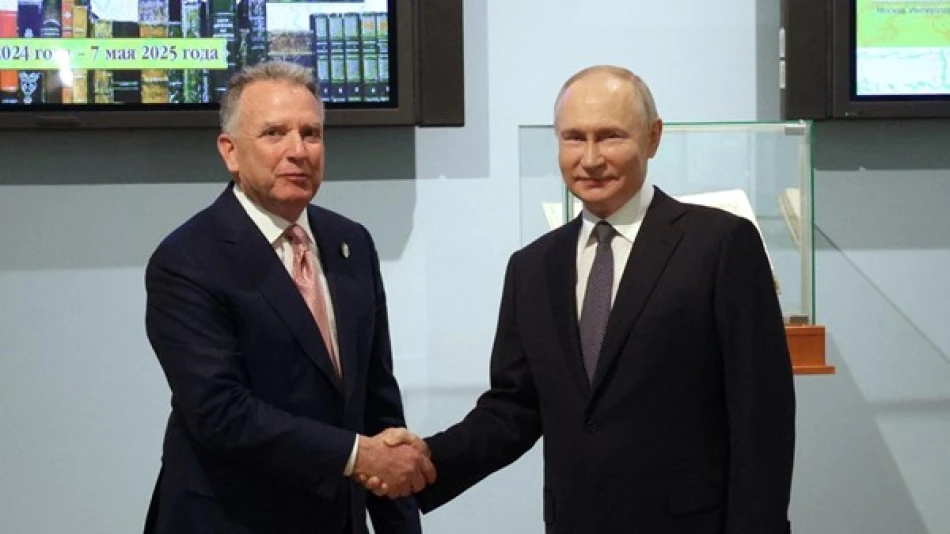
Russia Responds to Anticipated Visit by US Presidential Envoy
Trump's Nuclear Gambit Raises Stakes as US Envoy Heads to Moscow for Ukraine Peace Talks
As President Trump's Friday deadline for peace progress approaches, Russia signals readiness for "important and useful" talks with US Special Envoy Steve Witkoff this week, even as nuclear tensions escalate following Trump's deployment of two nuclear submarines to counter Russian threats. The high-stakes diplomatic push comes amid intensifying combat and rigid negotiating positions that have stalled three previous rounds of Istanbul peace talks.
Moscow Welcomes Diplomacy Despite Escalating Nuclear Rhetoric
Kremlin spokesperson Dmitry Peskov expressed optimism about the upcoming Wednesday or Thursday meeting with Witkoff, calling the discussions "important and useful" while appreciating US efforts to end the conflict. When pressed about avoiding additional sanctions, Peskov's response was direct: "Yes, reaching an agreement that stops people from being killed."
This diplomatic opening occurs against a backdrop of nuclear posturing that recalls Cold War brinkmanship. Trump's decision to deploy nuclear submarines followed an online exchange with former Russian President Dmitry Medvedev, demonstrating how modern conflicts now play out across digital platforms as well as traditional diplomatic channels.
The Nuclear Submarine Card
Trump's announcement that two nuclear submarines are "now in the region" represents a calculated escalation designed to strengthen his negotiating position. While he didn't specify whether these are nuclear-powered vessels or carry nuclear warheads, the ambiguity itself serves as a deterrent. Ukrainian Presidential Office head Andriy Yermak praised the move, noting that "the concept of peace through strength is working" and that Russian nuclear threats suddenly quieted after the submarine deployment.
Entrenched Positions Complicate Peace Prospects
Russia's demands remain unchanged since the conflict began in February 2022: Ukraine must formally cede four partially annexed regions—Donetsk, Luhansk, Zaporizhzhia, and Kherson—stop receiving Western weapons, and abandon NATO membership aspirations. These maximalist positions, combined with Ukraine's refusal to surrender territory, suggest any breakthrough will require significant compromise from both sides.
Putin reiterated Friday that while he wants peace, it must be "lasting and stable, based on solid foundations" that satisfy both countries' security needs. This language echoes Russia's historical sphere-of-influence thinking, viewing Ukraine's Western orientation as an existential threat.
Combat Intensifies Despite Diplomatic Efforts
Military activity has actually escalated during the diplomatic push. Russia launched its highest monthly drone count since the invasion began, according to analysis showing intensified bombardment despite US warnings. Monday alone saw dozens of drones shot down by both sides, with Russian strikes in Zaporizhzhia killing four people and one death reported in Kherson.
Zelensky's frontline visit to Kharkiv, where he awarded medals and inspected fortifications, underscores Ukraine's determination to resist Russian attempts to establish a "buffer zone" along their shared border. The president also announced preparations for a prisoner exchange involving 1,200 Ukrainian soldiers, based on July Istanbul negotiations—one of the few areas showing concrete progress.
Trump's Deadline Strategy: Calculated Risk or Dangerous Gamble?
Trump's Friday ultimatum—make peace progress or face increased sanctions—represents a high-risk diplomatic strategy. Unlike previous administrations that emphasized process over outcomes, Trump is betting that artificial deadlines and nuclear posturing can break a stalemate that has persisted through multiple negotiation rounds.
The approach mirrors Trump's first-term tactics with North Korea, where dramatic gestures and personal diplomacy initially showed promise before ultimately failing to achieve lasting agreements. However, the Ukraine conflict involves higher stakes, with NATO credibility and European security architecture hanging in the balance.
Market and Geopolitical Implications
Financial markets are closely watching these developments, with energy prices and defense stocks particularly sensitive to escalation risks. Trump's threat to impose "secondary tariffs" on Russia's remaining trading partners, including China and India, could reshape global trade relationships and force neutral countries to choose sides.
For Europe, the negotiations represent a critical test of transatlantic unity. Any US-Russia bilateral deal that sidelines European security concerns could fracture NATO and encourage further Russian aggression. The nuclear submarine deployment signals continued US commitment to deterrence, but also raises questions about long-term strategic stability in a multipolar world.
Most Viewed News

 Layla Al Mansoori
Layla Al Mansoori






